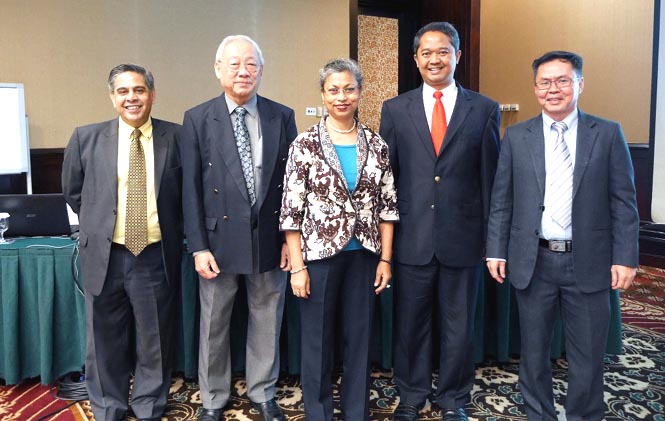IPCC's Fifth Assessment Report Findings shared in Nepal
IPCC's Fifth Assessment Report Findings shared in Nepal
CDKN, with their partners in Nepal disseminated the findings of IPCC’s Fifth Assessment Report in Kathmandu, with a specific focus on implications for Nepal. Pawan K Neupane and Dr BimalaDevkota from NCCKMC-NAST write about the event and its success
Despite a heavy rainstorm in the capital city of Nepal on 26 February 2015, a large number of participants overcame travel difficulties and gathered in a cozy hall embellished with colourful flowers at Hotel Malla. A large banner reading‘What Does IPCC's AR5 Mean for Nepal?’hung on the front wall. The event to share the Fifth Assessment Report (AR5) by the Intergovernmental Panel on Climate Change (IPCC) had already been kicked off on 25th February 2015 with a policy dialogue on IPCC's AR5 findings for Nepal. Dr Krishana Chandra Paudel, Secretary of Ministry of Science, Technology and Environment, special guest at the event made a worthy statement that it is important to understand what climate change is and what climate change is not,and disseminate the AR5 findings on climate change issues for the indigenous rural communities in local and simplelanguage.
The Nepal Climate Change Knowledge Management Center (NCCKMC), a national hub for managing climate change at the Nepal Academy of Science and Technology (NAST) began the sharing event for the Fifth Assessment Report (AR5) of Intergovernmental Panel on Climate Change (IPCC) with a technical session. The participants represented various organisations, including policymakers, academicians, researchers, students and development partners.Three Lead Authors of IPCC’s AR5, Prof Dr NH Ravindra Nath, Prof Dr Krishna Achuta Rao and Prof Dr Edvin Aldrian were present at the event to share the findings and interact with the participants. The day long programme engaged the authors to conveythe findings of the report, its implications in South Asia and Nepal, as well as the IPCC's process for preparing the report.The interactive Q&A session was chaired and moderated by Prof Dr Bishal Nath Upreti, an Academician of NAST and a prominent geologist. The audience’s participation in the session was remarkable, bringing forth interesting queries and curiosities regarding the findings of the report.
A separate interactive session for a cohort of students studying climate change science at various institutions was particularly appreciated. The students expressed their excitement to interact with Lead Authors of IPCC's Fifth Assessment Report and raise their queries as well as put forward their views on climate change issues and AR5 findings. It is a rare practice in Nepal to have such special sessions only forstudents. Dr Dinesh Raj Bhuju, an academician of NAST chaired the session and motivated students to interact. Dr Bhuju inspired the students stating that he has a very bright picture in his mind in which by 2030 all the students and their family have an environmentally friendly lifestyle.
Er Dipak Gyawali, an Academician of NAST moderated a Hard Talk on climate friendly development, highlighting the mal-practices in development projects in Nepal, especially road construction work. The three Lead Authors and two climate change experts from Nepal, Dr Madan Lall Shrestha, an Academician of NAST, and Prof Dr Madan Koirala, an eminent professor of Tribhuvan University and member of climate change council of Nepal delivered their empowering views on the topic. They also answered questions raised by the participants. Prof Dr Jiba Raj Pokharel, Vice Chancellor of NASTwrapped up the event by summing up the session in his closing remarks.
The event was highly successful in sharing IPCC’s Fifth Assessment Report findings amongst governmental officials, researchers, academics, students, climate change and development practitioners, who are in the frontline of delivering climate change adaptation programs in Nepal. The participants are now aware of AR5 findings and it implications in South Asia and Nepal. They are expected to apply and share their knowledge with wider range of stakeholders at local level including communities in the rural areas of the country. The support from the Climate and Development Knowledge Network (CDKN), LEAD Pakistan, and Intergovernmental Panel on Climate Change (IPCC) is appreciated for bringing such an informative and useful learning event to Nepal.

